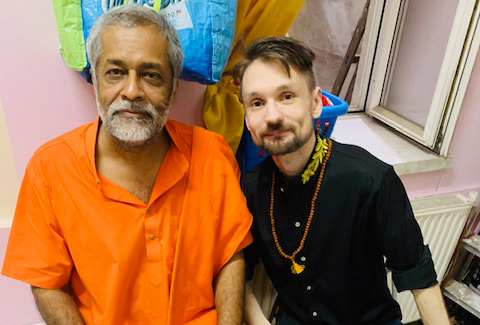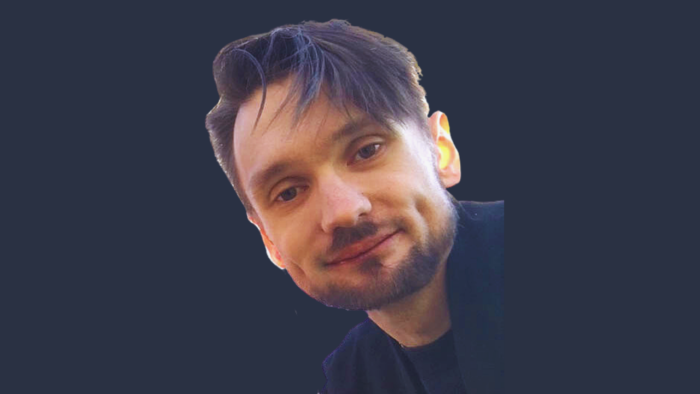The conversation with Thomas Felber began with a question on what turned him to Vedanta. Nothing more profound. But his answer was.
Born in Vienna as the son of "extraordinary sacrificing parents," who lived and subtly taught him values that would open him up to new experiences and influences, Thomas says his inspiration towards Vedanta "was appointed to manifest, as it were, supervised by Isvara because all impulses, motivations, ideas, etc., are nothing but consequences of one's past tendencies (or vasanas in Vedantic parlance), gathered from previous births or experiences."
As a teenager, he became interested in Eastern wisdom teachings, especially the journey toward the essence of all spiritual thought and was initiated as a Kriya Yogi around the time. A short private but memorable conversation with Paramahamsa Hariharananda when he visited Austria and nudged him to search for more.
After completing the three-year course of Vedanta philosophy directed by Swami Parthasarathy, Vedanta Academy, Thomas began a self-study of different Vedantic texts and teachings from Swami Chinmayananda ji, Swami Dayananda ji, and Sri Sri Satchidanandendra Saraswati. A disciple of Dr. Swaminiji Svatmavidyananda he has embraced a life immersed in spreading the message of Shankara.
What inspired you to turn to Vedanta. What and who influenced you in the early part of your journey?
A beautiful question. According to Advaita Vedanta, one can metaphorically say, all inspirations reveal Lord's thoughts because every moment is only Bhagavan's moment. Thus, everything can be seen as an inspiration to deliberate upon and how it contributes to one's inner growth and thereby helps to recognize reality as it truly is and not as one thinks it is. Hence my inspiration towards Vedanta was appointed to manifest, as it were, supervised by Isvara because all impulses, motivations, ideas, etc., are nothing but consequences of one's past tendencies (or vasanas in Vedantic parlance), gathered from previous births or experiences. Regarding who influenced me in the early part, I have to begin with my parents, considered as one's first teachers, who taught me fundamental values like being thankful and developing a certain degree of empathy. But I also must admit that, as a young boy, I was more of a comedian instead of being associated with religious practices. However, there was always a thirst for knowledge and particularly enjoying scriptures.
Somehow, in high school, I fell in love with the concept of infinity, and only Bhagavan knows why. I questioned a lot, but most mysteries about God, infinity, truth, remained unanswered, so I had to find a way to solve these doubts. At those times, I nearly read a book in a week and tried to get suitable answers. However, most scientific, even philosophical content was not enough to dispel my ignorance about specific inquiries.
I cannot exactly recall, but when I was around 16, I visited a spiritual bookstore not far away from high school. I regularly acquired or inspected books about comparative mysticism from there, usually after school. Wisdom by great teachers like Sri Ramana Maharshi, Sri Ramakrishna, Swami Vivekananda, Meher Baba, including Upanishads up to Kriya Yoga, answered many challenging questions, so the spiritual treasury of India turned into an inspirational driving force. Interestingly, Adi Shankara remained hidden at that time, but I was pretty happy, coming in contact by reflecting upon and meeting new like-minded friends.
So, what inspired me to turn to Vedanta? I would say it was my lack of understanding of the mysteries of life or reality itself.
What is the connection between human psychology and Vedanta teachings that attract non Indians to it?
I don't see Vedanta associated with any specific culture or drawing a line between Indians and Non-Indians. Because as human beings, regardless of race, color, class, status, or gender, we all want or strive to be happy, being free without having any anxieties. Consequently, there is an interrelation between human psychology and the teachings of Vedanta that attracts everyone. However, the advantage of Vedanta compared to any other empirical science like psychology is that it is the only efficient, time-tested methodology that can eliminate the root of all worries, called self-ignorance.
Etymologically, Vedanta, as the end portion of the Vedas (jnana khanda), moreover, as the only means to recognize that Absolute, as Adi Shankara beautifully said: idaM tu paramArthatattvamadvaitaM vedAnteShveva vij~neyamityarthaH, "This knowledge of the highest non-dual Reality can be realized (recognized) through Vedanta alone" (Mandukya Upanishad Karika, 4.99), the term is undisputably related to the Vedic culture. As one dives into the depths of Vedantic wisdom, it is beyond any borders and at the same time unites people. That is the beauty of truth itself. As Swaminiji Svatmavidyananda once told me: "Vedanta is not opposed or against anything." To use a famous Vedantic illustration of water, waves, and the ocean: Water can neither exclude waves nor the ocean as essentially only water exists. Seeing waves and an ocean happens because we do not realize that self-evident water. Therefore worries, desires, and tensions arise repeatedly.
From a Western perspective, many people seem to be unhappy with their answers or beliefs because sooner or later, many realize what appears will eventually disappear. Now, in Vedanta and Buddhism, the term enlightenment or liberation became popular, hence attractive to follow something mystical, unusual. But what is often overlooked by many Western seekers is that the teachings of Vedanta are no escape routes, trying to bypass one's duties. One Vedantic teacher said: If one's mental maturity and discipline are not strong enough, the same old habitual thinking patterns and desires will repeat, regardless of being alone in the Himalayas or amidst a crowd.
In my humble opinion, it is natural why certain words trigger a longing to find an easy way out of one's miseries. Expressions like eternal, limitless, and absolute happiness can do that as they point indirectly towards our essential nature of what we already are and always have been. However, we think we are bound because we did not understand ourselves correctly, so we continuously strive or desire to be free, at least temporarily, either by pursuing more desires or avoiding certain circumstances.
Presently there are two current approaches to learning- one very simple, and easily assimilated. The other requires rigor, patience and dedication. Why have you chosen the harder path. Is it more intellectual than the relatively more accessible Bhakti marga.
I neither chose nor would I call jnana-marga or the path of knowledge a hard path per se. Undoubtedly, every human being has specific talents and abilities based upon his mental tendencies. For example, quantum physics for a scientist is less hard, possibly simple, than for someone with more inclinations towards composing music. According to Advaita Darshana, Bhakti Marga is considered more approachable because it always depends on the seeker's mind and his capacity to understand. According to Adi Shankara, Bhakti Marga, like Karma-Yoga, is about preparing one's mind to become qualified for the path of knowledge or jnana-marga.
However, it is also correct that both culminate in the full understanding of the ultimate Truth. It is like someone yearns to understand how physical laws work. One can worship a book about physics until he or she realizes that there is a need to open the book, study the words accompanied by a teacher, and eventually understand their essential meaning. Devotion or Bhakti-Marga is therefore not less worthy but serves indirectly towards liberation or moksha, the sole purpose of life.
The highest devotion or love is neither emotional nor based upon likes and dislikes. Because what is the dearest to all of us is always one's true Self, called Atman. It is that impersonal non-dual Self appearing as billion individual selves.
You have done enormous work on Shankara's works. You say in Germany and Austria, Vedanta has a small presence. How do you propose to spread it wider?
You are too kind. I do not see it as enormous. There are and were a lot of brilliant minds who did much more. I can only try to contribute to my own given abilities. Everything I did so far, all ideas which passed through my mind are because of Bhagavan. Therefore apparently, all work is Isvara's work alone. In countries like Germany, Austria, and other European countries, Vedanta is not taught exclusively so far as I'm informed. Some Vedantic lectures usually appear supplemental or mixed with Hatha Yoga trainings. As long as there is only minor awareness regarding Vedanta, I can only work upon various ideas, thereby making Advaita Vedanta's teachings more accessible to a broader audience. Thanks to modern technologies, there are many options available, such as speaking on popular video platforms, translating more Advaitic texts, or eventually opening a German-based institution solely devoted to Advaita Vedanta. Bhagavan knows!
What is it that is absent in present day European society which Sri Shankaras teachings offer?
What is absent is the capacity to think rightly, to discriminate between transient and permanent. This lack of correct thinking is universal, not related to any society. Hence Adi Shankara's teachings should be taught beginning in pre-school, designed according to mental readiness. What Advaita Vedanta indicates is universal, affects everyone's daily experiences. The western lifestyle is a lot about becoming someone or having something. Yet, sooner or later, a sense of incompleteness will persist regardless of wealth, status, or power.
Adi Shankara's teachings or Advaita Vedanta can solve this sense of incompleteness created by self-ignorance by offering a time-tested, proven methodology to understand oneself truly.
What is the approach Shankara offers you towards realizing your true self. At one point even the dependence on the guru has to go. Is one ever ready for that?
There is only one approach or method, called adhyAropApavAdA-nyAya appearing in different forms throughout sruti, Upanishads. As Adi Shankara himself stated in Gita 13.13 Bhashyam: tathA hi sampradAyavidAM vachanam — ‘adhyAropApavAdAbhyAM niShprapa~nchaM prapa~nchyate.a iti, “Those who know the right traditional method of teaching, stated as: "That which is devoid of all duality is described by (deliberate) superimposition (adhyaropa) and negation (apavada).”
And the teacher (Guru) who should be well-versed (shrotriya) in the scriptures, abiding in or better to say as Brahman without any trace of self-ignorance (brahmaniShTha), is a guiding light, supporting the student, however, from the student's point of view only. That is why a Guru remains as Guru as long as one is aware of differences, and in this case, respect, trust, and surrendering to one's Guru teachings are necessary.
Even concerning empirical knowledge, to understand something like Einstein's equation of E=mc^2, one has to surrender oneself to someone who knows, therefore eventually, one arrives at the same conclusion.
According to Advaita Darshana, the Lord Himself appears as Guru and as a student, as it were. The only seeming difference is that a Guru truly realized what IS, and the student has not. In the dawn of self-knowledge (aparoksha-anubhava), the guru-student relationship (Guru-shiShya-sambandha) completely dissolves, and Atman/Brahman, Truth Itself alone, shines forth.
You are building a huge body of work on Sanskrit and Vedanta. Are there seekers in the West who follow your work - are these individuals, institutions?
I am not aware of how many people followed or used the content for themselves or their purposes. Indeed, some appreciated it, but I assume many are not even aware of it. Advaita Vedanta often turns into a competitive play of words, even among so-called Advaitins. Competition, building fellowships, etc. those issues have nothing to do with the sole purport of dispelling one's self-ignorance.
What gaps are there in learning Vedanta for non-Indians. What would encourage more people to visit India?
I can only point to a few assumptions. First, the term "Vedanta" in many English translated books is associated with the term philosophy. Hence, it is often termed as "The Vedanta Philosophy," being one of six major schools of Indian philosophy. Now in the West, philosophical studies are usually linked with ideas about abstract and dry reasoning. That is one, perhaps one of the most significant barriers why common people stay away, even starting with Vedanta. Vedanta, as means, towards that all-pervading reality, is all-inclusive, covers the entire life, and can address issues beyond the empirical sphere. Consequently, it is the opposite of abstractness but dynamic and interrelated to everyone's experience.
Another gap could be learning the Sanskrit (sanskritam) language or becoming familiar with important terms and concepts, which involves time and daily commitment. Speaking of commitment, Vedanta also requires practice to strengthen one's capacity to think and inquire, preparing to understand the subtle truths as echoed in the Mahavakyas like Tat Tvam Asi. That is why Vedantic courses are around three years or longer. Hence, patience and moderation are needed, rare habits in Western materialistic-oriented societies. A few years ago, I recorded two lessons in German about a Vedantic text attributed to Adi Shankara and then asked for feedback. The content was not the problem, but the length of only one hour was for most listeners too long. Same I recognized in meditation classes of trying to sit for 30 minutes. The true purport of Vedanta must be simply and clearly explained adjusted to a Western audience. Then I am sure people will find a way to seek guidance from a traditional teacher and become perhaps motivated to join Vedantic courses in India.

What role do you see for yourself in the preservation of Vedanta?
To quote William Shakespeare: "All the world's a stage, And all the men and women merely players; They have their exits and their entrances." I play that role Bhagavan assigned to me, as it were. It seems undoubtedly related to Advaita Vedanta Darshana, especially regarding Germany or other countries in Europe. It covers many areas like translating other texts or Adi Shankara's works into German, or speaking about particular topics. Also, outside of Europe, there are several opportunities. Numerous spiritual treasures are still not translated, not even transliterated—moreover, new concordances, for example, on Sri Suresvara's works, are not available. Since last year, I have been working on a massively expanded version of Adi Shankara's encyclopedia, divided into hundreds of topics with thousands of Bhashyam references, including transliteration. There are much more concepts like building a scriptural archive solely devoted to Advaita Vedanta or a custom Prasthantrayi Bhasyam search engine for those who cannot read Devanagari. I regularly discuss specific topics with my teacher, Dr. Swaminiji Svatmavidyananda, and other great scholars. Even being only associated with Vedanta is joyful.
Can you share some of Shankara's insights that have inspired you the most.
I consider every line written by Adi Shankara as insightful. His works are more than masterful. Adi Shankara's way of arguing respectfully should be an ideal in modern debates. Furthermore, as often wrongly believed, Adi Shankara was not the founder of Advaita Vedanta. He was a masterful thinker, teacher, and writer. He restored what was nearly forgotten, not to develop a new faith but to make people aware of their ignorance and how the words of the early scriptures, sruti can dispel it. That's why he is also called Bhāṣyakāra, the great commentator. In his Bhasyham, there are references where he praised his Paramaguru Gauḍapādācārya, in other treatises, his Guru Govinda Bhagavatpada, and the entire traditional lineage of teachers (Sampradaya Guru Parampara). He clearly showed respect towards other teachers like Bhagavan Bādarāyaṇa, Upavarsah, and Jaimini. Perhaps the most striking insight is that a mastermind like Adi Shankara never considered anything his own but served for the benefit of society during his short period of physical presence. He did not write a single line about his personal life because all ascribed biographies were written centuries later. In my humble opinion, a true teacher does not even think for a moment about being a teacher but supports and dispels confusions, and Adi Shankara proved that to all of us!





